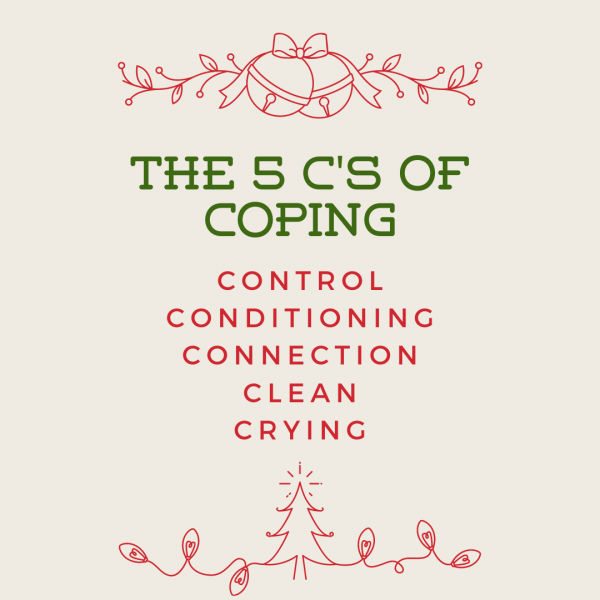If you or someone you know is in crisis, please call the National Suicide Prevention Lifeline at 800-273-8255.
With the twinkling lights, quality time with friends and family and the joy of sharing traditions, the holiday season can be magical. It is the most wonderful time of the year, as the song says. But, sometimes, the holiday spirit can be hard to muster.
Even during a “normal year,” the holiday season can bring about feelings of stress, anxiety and depression for some. The additional pressure and uncertainty brought about by COVID-19 can be compounding the financial concerns, grief and isolation often felt at this time of the year.
Local psychologist Sandi McMahon, PsyD, LPC, says that unrealistic expectations can be the root of many bad feelings during the holidays.
“We tend to expect the idyllic Christmas scene played out on the Hallmark Channel, or the movies that depict a bubbly, electrified party on New Year’s Eve where everyone is kissing and toasting champagne, when really it is more Comedy Central or a Lifetime Drama,” McMahon said. “And, those are just the expectations that we place on ourselves. There are many expectations that are put on us by others, or worse yet, the expectations that we perceive that others are placing on us.”
During stressful times, particularly the holidays, McMahon recommends using what she calls “The Five ‘Cs’ of Coping”: control, conditioning, connection, clean and crying.

The first “C,” control, means deciding what you can control and accepting the things you cannot. The expectations around travel, visits and gift-giving can be an annual conflict for some families. This year, in the midst of a pandemic, many may not have as much control over their traditional holiday plans. While that can be disappointing, McMahon says it can be helpful to accept that it is beyond your control and place more focus on other things.
“You can’t control the fact that we are in the middle of a pandemic and the holidays look a lot different this year,” said McMahon. “Let yourself feel how you feel, and then either let it go or apply some more coping skills to get through it.”
Another coping skill, the second on the list of “Five Cs,” is conditioning. We can condition our bodies to more effectively handle stress by getting enough sleep, proper nutrition and adequate exercise. McMahon says getting outside for a walk or fresh air for 20 minutes a day can be beneficial. Additionally, it can help to do activities like coloring or crossword puzzles that can be relaxing while still keeping your mind attentive.
Connection is the third “C.” While normally physical closeness can keep you calm and feeling connected, this season, many of us may not be able to see or hug our loved ones living outside our own households. Instead, it can be helpful to keep reaching out to the people in your life in any way you can. Connection can also be achieved by performing random acts of kindness for strangers.
“While using Zoom and FaceTime with friends and relatives is not the same as hugging your loved ones at your annual holiday party, it is so important to do something during this time, because isolation is hard and even harder during the holidays,” McMahon said.
The fourth “C” is clean. Taking a shower and putting on clean clothes every day are simple things that can help ease feelings of stress and anxiety, along with cleaning and organizing your physical surroundings. During busy times like the holidays, these things can become easy to forget if you start to feel overwhelmed. And while you clear the clutter from your home, McMahon says you should also try to clear your mind.
“While you are cleaning your home and body, please also clean out your mind and stop comparing yourself to others who may be finished decorating, wrapping, and baking, while you have not yet bought a single gift,” said McMahon. “Talk kindly to yourself and reach out to your people if you need a boost.”
The last of the “Five Cs of Coping” is crying. McMahon says crying or, conversely, laughing, can be a healthy way to cope with stress.
“I believe that too many people suppress the need to cry because they perceive it as weak or have the ‘men don’t cry’ attitude,” McMahon said, “but the act of releasing tears can help the body work through stress and regulate various levels in the brain.”
McMahon also recommends using laughter to cope with the sadness or stress brought on by the holidays. It can be helpful to watch a funny movie, watch videos on YouTube or TikTok, or reminisce about past funny memories with family.
For some, managing stress and anxiety alone may become too overwhelming without additional support. NAMI Greater Wheeling is a local organization working to improve the quality of life for individuals living with mental illness by providing community outreach, public education, advocacy and family support. The NAMI Drop-In Center, located on the first floor of 1035 Chapline Street, is a resource for emotional support, recovery assistance and even creative activities and outings for those in need.
Julie Gomez, Executive Director of NAMI Greater Wheeling, says the organization sees an increase in demand for services around the holidays.
“The holiday season can be stressful for all of us and, potentially, a challenging time for those of us living with a mental illness,” said Gomez. “It’s important to realize that traditional holiday activities and celebrations can be stressful and anxiety-producing for many of us, and even more overwhelming and potentially triggering for individuals living with mental health conditions.”
Like, McMahon, Gomez recommends practicing self-care during the holidays and only participating in activities and celebrations that you enjoy.
“Don’t over-extended yourself,” Gomez said. “If you’re not feeling up to participating in a celebration at work or with family or friends, it’s ok to say no and celebrate in a different way.”
NAMI Greater Wheeling offers free support groups during the holiday season for anyone who wishes to participate. In addition to the support offered at the Drop-In Center, in-person support groups are available on the first and third Thursday of each month at the Temple Baptist Church, located at 2300 2nd Street in Moundsville. In light of COVID-19, the organization has also started virtual support groups. Those sessions occur every Monday at 6 PM and Tuesday at 5:30 PM.
The services provided by NAMI Greater Wheeling are free of charge, and you do not need a referral or a diagnosis. For more information, please call 304-905-0635 or visit www.namiwheeling.org.
• Wheeling native Jennifer Materkoski is a graduate of West Liberty University and Kent State University, where she earned a master’s degree in journalism and mass communications. Before beginning her current role as director of communications and employee engagement for a global business process outsourcing firm, Jennifer worked in local media and non-profit communications. She is a current board member of Generation Wheeling, also chairing the organization’s Work Committee. She lives in Wheeling with her husband, Rich, and her three children: Mason, Mercer and Miller.


